by Warren Park
click on photos
The morning of my scheduled departure from Sidney, NS, I pulled up beside a public park, just across from a picnic table that looked inviting. I had with me what I needed to cook some scrambled eggs, so I unpacked enough to set up the little blue cookstove on the picnic table, and carried my cooler to the space beside it. Before I got very far into the food prep, I was visited by the local police. Apparently, someone had called them to warn about an out-of-province vagrant with a giant beard setting up in a major park near the ocean. The two policemen were friendly enough, but wanted to know about my plans. I told them that I had a reservation for the car ferry to Newfoundland that morning at 11:00 AM. That made them relax quite a bit. "Be sure to clean up everything when you're done," they reminded me as they walked back to the squad car. I left the site spotless. I suppose they did not want a possibly seedy guy planning to set up residence there for any length of time.
I made it onto the giant ferry boat, big enough for about two hundred cars on two levels. The trip was scenic and refreshing, but as the boat got further and further away from the shore, we got into the open Atlantic Ocean. The ferry began to undulate on some rather massive swells. It was not a rough day on the open water, but the rise and fall of the waves started to make me a bit queasy. I made my way into the main sitting area inside the top observation deck of the ferry, and to my surprise I met over a hundred passengers arrayed in various poses of splaying, sitting and lying, arranged in deck chairs, with heads propped and cushioned in inventive ways. The crossing of the ocean to Newfoundland's main port closest to Sydney took about seven hours, and some of the time involved quite a lot of up and down and side-to-side swaying. I was surprised to see that many of the folks were groaning miserably, much worse off than me. I found a chair to relax in with a book, but I soon joined them with some quiet vocalizations of my own. It was funny to hear the crowd's tone rise in pitch and volume when a particularly large swell sent the boat rocking askew; it sounded as if something alarming was happening at a football stadium, like when the quarterback gets viciously sacked.
After several hours of sea sickness (the first and last time I have experienced the full-fledged variety), the ferry pulled off the ocean at St. Pierre, a quaint French island sitting beside mainland Newfoundland's south coast. For an hour, about half the people made their way unsteadily down the gangplank to visit the happy little shops that faced the ocean and have a nice walk on solid ground. After that, the next hour and a half were very scenic and smooth sailing along the coast.
The land there was the most rugged I had ever seen. Everything was solid rock with many tiny bushes and trees struggling to make a life where there was 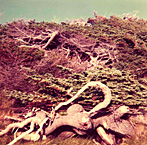 barely any soil to root in. It was easy to tell that every plant was under huge stress. The summer must have been their favorite time of year, with sun light and a little warmth working its magic. Otherwise, strong wind, bitter cold, hard rain, and extreme discomfort were what the world offered. Very few areas in Newfoundland can grow anything close to a forest. Scraggly bushes with badly twisted branches were very common. But it was all beautiful to behold. There were many well-worn fishing boats all around the shoreline, and tiny settlements that sometimes had no roads at all in and out of town. If there was a little shelter in a tiny cove somewhere, that's where a dozen or so shacks and cottages would cluster around each other, like guys in an ice-fishing house huddling together.
barely any soil to root in. It was easy to tell that every plant was under huge stress. The summer must have been their favorite time of year, with sun light and a little warmth working its magic. Otherwise, strong wind, bitter cold, hard rain, and extreme discomfort were what the world offered. Very few areas in Newfoundland can grow anything close to a forest. Scraggly bushes with badly twisted branches were very common. But it was all beautiful to behold. There were many well-worn fishing boats all around the shoreline, and tiny settlements that sometimes had no roads at all in and out of town. If there was a little shelter in a tiny cove somewhere, that's where a dozen or so shacks and cottages would cluster around each other, like guys in an ice-fishing house huddling together.
We made it to the docking area where the people and their cars, trucks and campers disembarked. Most of the vehicles made their way to the paved highway a half mile away, where they headed down the road for a couple of hours to the provincial capital, St. John's, the most populated city on the island (about 100,000 people). I looked over my map and after a half hour on the highway, I took a side road that seemed to be the only connector to a series of small places along the coastline. I tanked up at a gas station, using my always reliable Amoco card, and headed down a small dirt road, only wide enough for two cars side by side. It was all surrounded by the same crazy vegetation and complete wilderness. Once in a while, I'd see a waterfall or a place to admire the ocean at a pull-off.
For the next month or so, I drove those backroads, pulling into areas that were sheltered enough to spend the night. Occasionally I would find a spot that had a picnic table to park beside. Many of the small settlements had kids of all sizes playing beside the roads-walking up and down the car path was the most common pastime. For the teen-agers, meeting along the road in and out of town and chatting in clumps of acquaintances seemed to be the only fun thing to do. The littler kids would get excited to see my white van with a decoration of old fishnet strung across the front. Then they'd see my license plate, Minnesota! They were as amazed as if it read Argentina.
One of my biggest challenges was finding enough ice for the cooler. I couldn't keep any food for long without it. The gas stations were few and far between and most of the time there were no stores connected to them. No ice to buy anywhere. Occasionally a store keeper would give me the ice from the fridge in his own house (attached to the back of the store), where his family lived. My food sometimes had to be tossed out because I could not find ice to keep it from rotting. The stores I came across did not have much to offer, just basics like canned veggies, some eggs, cans and bottles of soda, bread, and crackers. I could get water at any brook I crossed; the water there was as pure and clean as any bottle of Perrier.
Once, in my foolish, hopeful innocence, I bought a small bottle of mayo to make a little tuna salad. It tasted good in the evening, but when the sun came up, I ate a little of the leftovers with some bread. The ice I had in the cooler the night before had melted, but the cooler seemed to have retained enough (barely) of its saving coolness. Trusting it was a really bad idea. I was violently sick for three days. I stayed in my van, isolated from people, near the seashore. The whole time, I never went anywhere, except to the woods for my frequent throw-ups and diarrhea (Luckily, I had toilet paper with me). I was chastened after that, and always avoided any food I had that might be a little spoiled. I should have known better.
My travels on those rural roads were fascinating and educational. I did talk with people once in a while (in addition to the short conversations with attendants when getting gas for the truck). One time I heard some music played by a teenager with an electric guitar and a small amp. He was outside, displaying his moderate skills, and I pulled over. I had in the back of my truck a small keyboard I used to help me with my music writing. (I wrote my whole 3rd woodwind quartet, nick-named Newfoundland while traveling there.) This keyboard was specially adapted to playback through the car radio-a special trick an electronically knowledgeable friend managed to hook up. The keyboard itself needed to be powered too, and it had a special electrical connector that plugged into the cigarette lighter. Thus, using the keyboard drew power from the car battery in two ways. Too often, during my travels I drained the battery to nearly dead playing that keyboard. (At least once I needed to get my van rolling down a little hill, and then running to jump into the driver's seat to turn the key and pop the clutch to get the van started again.) The teen guitarist was friendly, and he had about three guys there listening to him. We decided to do a little jamming and for about ten minutes we found some common ground, playing some chords for a couple songs we both knew. It was a fun break for me, since my life in isolation was sometimes a little boring, with little human contact.
One place on the trip was a little surprising because my map showed there was a road through this barely-visible-on-the-map fishing hamlet. But when I drove across the shoreline through a sandy area where the road surface was only barely harder than sand, the only way to continue along this stretch was to take a turn up a slight hill that looked like someone's driveway, narrow and dusty. I worried I had gotten off the regular roadway somehow, but at the top of the rise, I turned right and found a one-block-long street with buildings, shops, and homes on both sides. That was the main and only road, and after a short distance, it took another turn and transformed back into complete wilderness
Another slightly larger town was built around an inlet where a dozen fishing boats were tied up to a wharf, with several empty mooring places-boats out at work, I presumed. Shops along the way where the cars could drive often were small shacks no wider than fifteen feet. The only signs on the shacks were the owners' names, with no explanation as to what they did or sold there. I gather that everyone knows what, e.g., Clive Wilson does, so there was no need to explain anything further. I parked the van beside the shack that had the sign for Canada Post. I went inside to get some stamps for my postcards, and halfway through the transaction, I heard a car honking over and over again outside. There was a guy who was unhappy about my van in his private parking spot, next to his business. I hurried outside and moved my van to directly in front of the post office, and he raced his car into the gap I had just vacated. How was I to know that was his personal place? I went back into the post office to finish my purchase, and the clerk told me, with a smile "He's always doing that."
Sometimes in my search for ice, I got lucky. Newfoundland, it turns out, has whale processing factories along the coast. I drove through three towns with factories like that. In one village, I could see giant rib bones beside the road drying in the sun. They were thirty or forty feet long! I'm not sure what the locals would do with these huge bones, but they were not the sort of artifacts you'd find anywhere else. Sell them to visitors? Probably not-how would you transport something like that? I approached one of these whale processing plants (I could see huge racks of dark rich meat inside), to see if they might spare some ice. I assumed they would be using some to protect the meat when it got shipped away. One worker walking past, when he heard I needed some ice, gestured for me to come with him. I carried my cooler and followed him into a building with a room about fifty feet high and eighty feet long that was completely stacked with huge piles of ice cubes. The factory had ice makers going almost non-stop. "Help yourself," he told me. "No charge." It was like manna from heaven, and it probably cost them two pennies to make a cooler full of it, so I didn't feel like I was putting them out at all. I filled the cooler and had enough ice for three or four days.
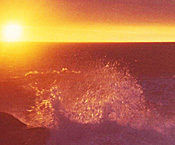
One late afternoon I chanced upon a winding dirt road beside a long inlet in the ocean labeled To the Cape Dawson Lighthouse. (I'm probably remembering the name wrong.) The road was about four miles long, but I stopped at a pull-off about halfway. This place was on the top of a beautiful hill overlooking a body of water that was no more than 200 yards across. It was rugged territory with some dramatic rocks along the shore (easy to walk to) which sprayed seawater magically when the rather big waves came in. It was an exciting experience to see those curling breakers crash into the rocks. Toward evening the fog came in, settling all around the whole point. Soon an array of foghorns started up, starting with the distinctive (and loudest) double-note high-lowwwww sound from the lighthouse itself, over a mile down the road. Then, to my amazement, another horn started up that had a different distinctive noise, just across the water from me. This was followed by four others horns pealing their own pitches and patterns. These odd beepings and dronings were obviously marking the places on the coast line that stuck out recklessly into the water. Anyone coming inland a couple of miles to the harbor in the fog or the dark would know where they were by listening and could envision what to avoid. It was a very sensible and remarkable spread of loud noise makers up and down the whole inlet. With no organization to the timing of the horns, what resulted was an amazing symphony of six foghorn voices, each noticeably different than the others, some more in the distance. What a lucky spot for a musician to land!
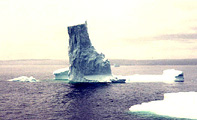
In another, larger village down the road, I saw a remarkable sight. In the harbor just about a hundred yards from the shore was an enormous iceberg jutting into the air, stuck on the shallow sea bottom. I thought about my cooler again, and parked my van near the water to look for ice. (Also, so I could take some unique photos.) To my surprise, the water was filled with many various-sized chunks of ice which had split off from the iceberg and were floating around everywhere. I brought over my cooler-it had no more ice in it that day. I struggled to lift a reasonable-sized ice piece out of the water, but it was too slippery for me. A passer-by, a healthy middle-aged Newfoundlander, saw my plight, including my open cooler, and helped me fish a fine lump of iceberg out of the sea and dump it into the cooler. It took up about half the size of the box. Bonanza!
I found a good place to park my van the next day, in kind of a public area near a waterfall, just a couple of miles outside of a village of probably 3,000 people. I loved to watch, from the cliff above, all the schools of tiny fish, swimming in masses of at least 10,000 or more. They must have been sardines or anchovies or the like. In a school like that, with no leader, the fish 'school' kept folding around each other and changing direction as a giant aimless group. I wished I had a video camera with me. My instamatic camera could not do justice to the scope of the visual action.
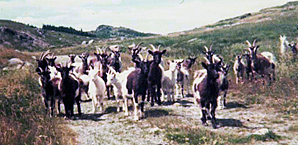
Occasionally on the road I would come across small herds of free-range goats. They were friendly but liked to stay together. I don’t remember seeing any other animals, except for one or two at a time. Perhaps the climate was too cold too much of the year.
One day in my travels, outside a fairly large city (perhaps 20,000), I sort of lost my way. I don't know how it happened, but I missed the road through town that I was supposed to follow. Instead of sailing through without any confusion, I ended up stuck in a sudden parade of cars all headed the same direction down a side road. A traffic jam in Newfoundland? Impossible! But I was stuck with them for a while and had to follow the herd until I could right myself and return to the main street. The line of cars proceeded across an actual airplane runway, turned around a hill and there it was! Where everyone was headed. This was the time of morning that the work-shift changed at the enormous fish processing plant, where about three hundred people worked at one time. It may have been a cannery too. I knew I was not on the work schedule that day, so after a while I was able to break away from the procession and turn around. A few other cars were going out, too, so I was not alone in my purpose. I was just about back around the bend again when workers on foot stopped all the cars in both directions. So we had to wait. Why became obvious as the noise of an approaching propeller airplane came out of a cloud. Soon, a small, single-engine, probably 18-seater plane appeared, growing closer and closer to the runway. The cars looked awfully near to their flight path, but the workers knew what they were doing, and the place landed safely in front of us, then taxied to a warehouse down the way. The workers motioned us to go on again, and soon there was another traffic jam with most of the cars coming at me. There were lots of fish plant employees yet to arrive, and I was pleased to get free of them all. In town again, I found where I should have followed a different street through the three-block downtown area. That was about 45 minutes out of my day which I could never recover.
Toward evening on another day, having found a nice open space in the woods to park my van for the night, I happened to fall in with a group of four travelers who were staying at a nearby campground. They drove into the same area I was settled, and they curiously asked me about ending up so far away from Minnesota. They were nice people from Ontario. I told them I was born there. It was through them that I later found myself in a rented boat with them not far from shore. The boat had a small outboard motor on it, but the boat was just drifting in the water for what we were up to. We all had in our hands strong fish lines attached to substantial sharp hooks about three inches long. We were all learning how to catch ocean fish by "jigging." This is a simple process where people hang the lines overboard, and yank the lines up about two feet, over and over again. The fish get curious and swim up to the shiny, fast-moving objects. Once in a while, they get impaled by someone's hook. I caught a flounder that way, my first. It was about a foot and a half long! No one else caught anything that time, so we all took my flounder back to their campground and fried it in a pan on their fire. It was big enough for us all to have a meal, with some fried greens. What an exciting event for someone who had never before been on a small boat on the ocean.
A couple of days later I was invited by the same people to go down to the shore and meet a young genuine Newfoundland fisherman. This guy had been born into this life-he, his parents, and his brothers, all made their living this way. With encouragement from the Ontarians who had met him a couple of days before, we were given a demonstration by a real pro of how to clean and fillet a fat freshly-caught codfish over two feet long-in record time. At about age 22, this guy's strength and skill was amazing to behold. He had everything set up already: the fish on a clean table with plates, knives and a bucket to contain the non-useable fish parts. One of the onlookers looked at his watch and suddenly yelled, "GO!" The Newfoundlander surprised everyone by bending the fish's head completely backward and snapping it off with both hands. The fish spine made a big, broken-branch sound as he performed this move. Then he dressed the fish, getting rid of all the innards with skillful knife thrusts, and soon he was delicately, with lightning speed, cutting through the skin and folding it back to get at all the flesh waiting there. He produced what seemed to be about ten fat fillets from each side of the fish, probably at least fourteen pounds of codfish for the open-air market in town. His time: 2 minutes and 15 seconds. It was the most amazing fish filleting demo I had ever seen. Wow. Okay, I may not have seen many of those, even on TV.
Newfoundlanders talk with a strong accent, sort of an off-shoot of Irish with a twist. It was mostly understandable, but some people were unintelligible to me when they talked fast. I once asked a store clerk how to get to a nearby town called English Harbor. He said. "Angleesh Harba?" He pointed in the direction I was to drive. "Ye go bock to ta meen rood, fur aboot three moiles…" ("You go back to the main road, for about three miles…"). I once picked up a hitch-hiker in his early twenties who had an interesting way of making all his verbs in third person, apparently a common practice in some parts of Newfoundland. I asked what he did for a living, and he told me, "I works for the provincial schools. I travels around from school to school helping set up during summer, and in fall, I teaches." Fourth grade kids, it turned out. He asked me, "Did you land in Newfoundland?" by which he meant did I move there. "No, I'm just visiting," I told him.
On another day, I stayed overnight on the top of a ridge overlooking the sea (great sunset), near a settlement that was down on the shore on the other side a cliff. I walked around for a little while after I settled in where I was parked, and came across an odd sight: all across the rocky surface I was standing on, at the top of the hill, was a whole field of television antennas, possibly 30 or more, each with its own wire trailing down to the homes below. All facing one direction, presumably toward a distant broadcast tower some miles away. This was way before cable TV existed, so people had to do whatever they could to get a signal. I turned around and went back to where the van was; I didn't want to disrupt the reception for all those watchers hidden below the 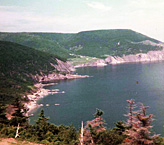
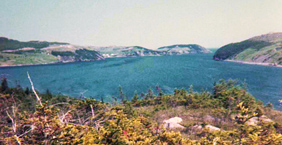 cliff.
cliff.
Once in a while the road would come to the top of a rise and the vistas that appeared were a wonder to behold.
As I mentioned earlier, I was on the road this way for about a month. I saw some remarkable sights, including parts of a wonderful national park on the west side of the island. I stayed at the end of a several-mile-long peninsula that came to a stop facing west, with no land in sight beyond the ocean. Great place for a few more photos of the sun setting, from a high overlook this time. I met fellow travelers sometimes, but the vast majority of my time I was alone with my thoughts, relishing and communing with the wild nature around me. The roads were dusty and rough, and the residents genuinely unique characters. It was a great experience for me, and, as I mentioned, I got some interesting music written, good books read and mental health improved.
I circled around almost the entire coast of Newfoundland during that month, wherever there were roads to follow, and ended up back at the same ferry launch where I arrived. Then I made it back to the mainland, this time with less sea sickness, and before long I was back at my sister's place in Fredericton. A few days later, I returned home to Minneapolis to pick up my life again. Newfoundland will always be a special place for me.